Newsletter 2018/4
December 2018
Introduction
Three months on from our last newsletter, I look back at a period of intense judicial activity at the Tribunal during which both hearings and deliberations were held in The M/V "Norstar" Case (Panama v. Italy). Six days of hearings were dedicated to the case, oral arguments were heard from four legal representatives of Panama, led by the Agent, Dr Nelson Carreyó Collazos Esq., with testimony given by three witnesses and one expert called by Panama, and from five legal representatives of Italy, led by the Co-Agent, Mr Giacomo Aiello, with two experts called by Italy. After the close of the oral proceedings, the judges reconvened to commence the initial deliberations on the case.
The Forty-sixth administrative session of the Tribunal was organized between the hearings and deliberations. The two-week session was dedicated to legal matters, such as the amendment of the Tribunal’s Rules regarding the submission of a second round of pleadings, discussions on the latest developments in the law of the sea, and administrative matters. During the session, I was pleased to receive the President of the Korea Maritime Institute (KMI), Mr Changho Yang, and to sign with him an MoU committing KMI funds to the ITLOS Trust Fund for the Law of the Sea for the organization of the next ITLOS regional workshop to be held in Uruguay in 2019. Such outreach events are fundamental to our work, as only when States are fully aware of the potential for the Tribunal to assist them in the settlement of any law of the sea-related dispute will recourse be made to this forum.
During this busy time we also had the opportunity to welcome ministers and delegations from around the world, including Mr Masahiro Mikami, Director General of the International Legal Affairs Bureau of the Japanese Ministry of Foreign Affairs, and Mr Young Choon Kim, Minister for Oceans and Fisheries of the Republic of Korea, as well as the heads of various international organizations. The Secretary-General of the International Maritime Organization (IMO), Mr Kitack Lim, visited the Tribunal on 4 September 2018, allowing for an exchange of views on matters of common concern and discussions on cooperation between ITLOS and the IMO. The dialogue between law of the sea and maritime law is of great importance, as can be seen by the number of cases submitted to the Tribunal with a bearing on the work of the IMO, such as the arrest and detention of vessels and their crews and claims for compensation pursuant to such detention.
On 24 September 2018, Mr Michael Lodge, Secretary-General of the International Seabed Authority (ISA), was in Hamburg together with Mr Alfonso Ascencio-Herrera, ISA Legal Counsel, to meet with the Tribunal as a whole and with the President, Judge Hoffmann and members of the Seabed Disputes Chamber. The ever-increasing interest in the mineral resources of the Area[1] means that the exchange of information between ITLOS and the ISA is becoming more and more relevant and such opportunities to meet are always welcomed.
Finally, Under-Secretary-General for Legal Affairs and United Nations Legal Counsel, Mr Miguel de Serpa Soares, paid a visit to the Tribunal, meeting with the judges and discussing matters of relevance with them. During his visit Mr de Serpa Soares emphasized the growing importance of the oceans for the United Nations Member States and the role the Tribunal will play as one of the dispute-settlement fora for the peaceful resolution of disputes.
As you know, the Tribunal lost one of its founding members in October. The passing of Judge and former President P. Chandrasekhara Rao on 11 October 2018 has greatly saddened us all. Judge Chandrasekhara Rao was elected to the Tribunal on 1 October 1996 as one of the founding judges and served until only last year, contributing enormously over the course of two decades to the jurisprudence of the Tribunal as well as to the further development of international law of the sea. You can read a tribute to Judge Chandrasekhara Rao by the Registrar, Philippe Gautier, below.
I hope that you enjoy reading the newsletter.
With my warmest regards,
Jin-Hyun Paik
President
ITLOS Cases
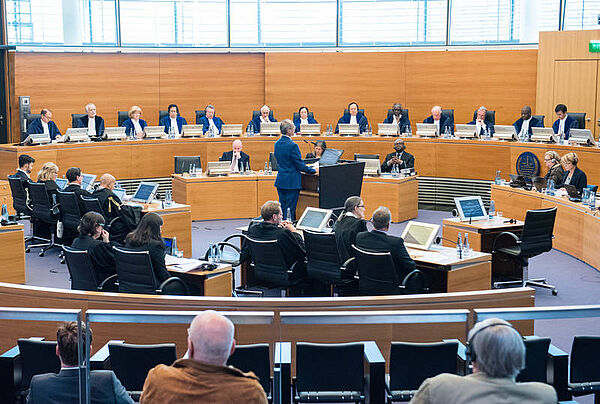
The M/V "Norstar" Case (Panama v. Italy)
After a week of hearings, the oral proceedings in this case concluded on 15 September 2018. An archive of webcasts, the verbatim records and a selection of photographs from the hearing are available on the case page on the Tribunal’s website.
The Tribunal plans to deliver the judgment in the case in spring 2019, some six months after the close of the oral proceedings.
Interview with the President of the Seabed Disputes Chamber, Judge Albert Hoffmann
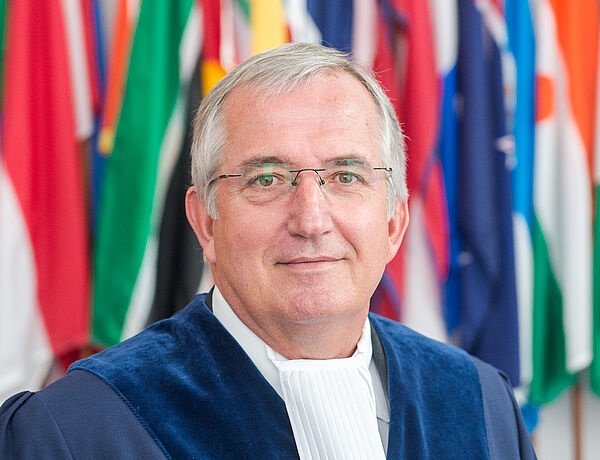
You have been President of the Seabed Disputes Chamber since October 2017. What makes this Chamber so special?
I first need to highlight the fact that, although the Seabed Disputes Chamber is constituted as a chamber of the Tribunal, it functions independently from it and plays an important and prominent role owing to the particular provisions in the Convention and the Statute of the Tribunal. Its 11 members are elected from among the judges of the Tribunal for a period of three years and, as is the case with the Tribunal, its members must be representative of the principal legal systems of the world and be based on an equitable geographic representation. What sets the Chamber apart from the Tribunal and other international judicial bodies is that, should a dispute arise, the Chamber is not only open to States but also to other entities that are sponsored by the States Parties. Such entities might include a commercial enterprise or a natural or juridical person sponsored by a State Party. To date the International Seabed Authority (ISA) (the body through which States Parties to the Convention organize and control activities in the Area)[2] has entered into contracts for the exploration of polymetallic nodules, polymetallic sulphides and cobalt-rich ferromanganese crusts in the deep seabed with twenty-nine contractors, some of which are State-operated concerns, others sponsored entities. Each of these entities has access to the Chamber through the dispute-settlement mechanisms available to them under the Convention and would be able to appear before the Chamber should a dispute arise. The jurisdiction ratione personae of the Chamber is therefore wider than that of the Tribunal and even wider than that of the International Court of Justice, access to which is limited to States.
Secondly, the applicable law is of course the United Nations Convention on the Law of the Sea and other rules of international law not incompatible with the Convention, that is in accordance with article 293 of the Convention. But article 38 of the Statute also states that, in addition to the provisions of article 293, the Chamber shall also apply the rules, regulations and procedures of the Authority adopted in accordance with the Convention and the terms of contracts concerning activities in the Area in matters relating to those contracts. Here, the unique nature of the Chamber again becomes apparent, as the scope of the applicable law is broadened to include provisions of the current and future ISA regulations in accordance with which activities for the exploration and exploitation of mineral resources in the Area are to be carried out (this would include the so-called “mining code” and other rules and regulations relating to the protection of the marine environment as well as those relating to the equitable sharing of benefits deriving from activities in the Area), and any contracts entered into between the ISA and States or other entities mentioned above, or contracts between States and contractors.
Thirdly, looking to future decisions of the Chamber, I would like to mention the fact that any decision of the Chamber against juridical or natural persons shall be enforceable in the territories of States Parties of such persons in the same manner as judgments or orders of the highest court in the State Party where the enforcement is sought. In this regard the Chamber once again stands out from the Tribunal, whose decisions are of course final and binding but not enforceable.
Where do you see the potential of the Chamber?
We should look at the importance of deep seabed mining for the global community today, as only when mineral resource activities enter the exploitation phase will disputes over such activities in the Area arise. Since HMS “Challenger” first discovered polymetallic nodules during its expedition in the 1870s we have known about the economic importance of deep sea mineral deposits but only in recent years, and with further discoveries of other types of minerals, has the demand for deep sea mineral resources been matched by the necessary technological advances to allow us to even consider mining in the Area a feasible alternative to land-based mining. We are rapidly approaching the day when deep sea mining will become a reality and, provided that the environmental impact of seabed mining can be effectively addressed, that industry is expected to boom. Michael Lodge, Secretary-General of the ISA, has recognized that there is a likelihood of significant disputes (both contractual and non-contractual) arising, which may be of high value and with potentially wide legal and practical significance. The Seabed Disputes Chamber is obviously best placed to deal with such disputes but we also need to ensure that we dispose of cases submitted to the Chamber in an expeditious manner.
In the meantime the Chamber could be called upon to exercise the advisory function assigned to it by the Convention and the Statute to clarify legal questions arising from the current phase of exploration and the transition to the exploitation phase. Recourse to the advisory jurisdiction of the Chamber was taken by the Council of the ISA in 2011 to clarify an issue originally raised by Nauru regarding the extent of the liabilities of a State sponsoring mining in the Area. The advisory opinion of the Chamber, then working under the presidency of Judge Treves, delivered its unanimous opinion on the “Responsibilities and obligations of States sponsoring persons and entities with respect to activities in the Area” on 1 February 2011, setting the highest standards of due diligence and establishing a legal obligation to apply the precautionary principle, to establish best environmental practices and to ensure the implementation of environmental impact assessments.
If you consider how the 2011 Advisory Opinion was received by States you can see the importance of the Chamber’s work. After 2011 there was a significant increase in the number of exploration contracts signed with the ISA. The clarifications provided by the Chamber were of paramount importance for States, in particular developing States, wishing to enter into contracts with entities conducting seabed mining by giving them the possibility for limiting their exposure to liability risks and in setting rigorous environmental standards.
Environmental organizations see the coming years as critical for this new frontier of resource exploitation. Can the Chamber be of any assistance in this process?
During this current period of transition leading up to the exploitation phase, the ISA and the sponsoring States licensed by it to conduct exploration activities in the Area need to ensure the protection of a huge expanse of the marine environment. The limits of the Area will only be known when all coastal States have submitted charts or lists of geographic coordinates indicating the outer limits of their continental shelf with the Secretary-General of the ISA but it is generally accepted that the marine areas beyond national jurisdiction including the seabed and ocean floor and subsoil thereof cover about 40 per cent of the Earth’s surface. The deep sea ecosystems are unique and extraordinarily fragile and they remain largely unexplored. Further extensive scientific research must be conducted to improve our knowledge and understanding of the marine environment in which deep sea minerals are located and needs to be taken into account in future mineral resource activities. Referring once again to the example provided by the 2011 Advisory Opinion, the Chamber is ready to provide legal interpretation and guidance, if so requested, on any legal question relating to activities in the Area of which environmental protection forms an integral part.
While the need for adequate environmental protection cannot be over-emphasized, it is important to maintain the carefully crafted balance in the Convention and to ensure that nothing is done to unnecessarily hamper commercial seabed mining in the Area when that becomes a reality, otherwise the lofty ideals of the Common Heritage will be of benefit to no one.
In Memoriam: Judge P. Chandrasekhara Rao
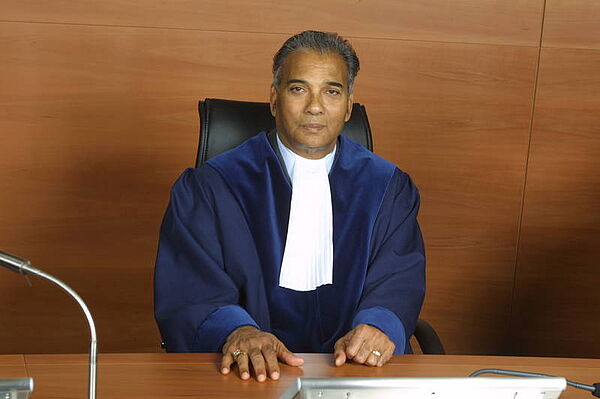
The month of October 2018 has been one of sadness for the world of international law, for during that month we learned of the death of Francisco Orrego Vicuña, Prosper Weil and Judge P. Chandrasekhara Rao. It is to the latter that these few lines are dedicated. Judge Chandrasekhara Rao was a member of the Tribunal from its creation and for 21 years thereafter. As the Tribunal’s President, from 1999 to 2002, he made his mark on the life of the institution. I wish to pay homage to him in this newsletter in my capacity as Registrar of the Tribunal, and on a personal level too, since it was he who taught me my trade and thanks to him that I began to discover India, the land of his birth. Demonstrating his innate curiosity, rigorous nature and scientific and human qualities, Judge Chandrasekhara Rao published numerous works dealing with constitutional and international law. In 2017, I spent a week with him in Hyderabad, to complete a book about the Tribunal which we were working on together and was published in February of this year. My short stay was very intensive, and it was during that time that he told me of his great attraction to spirituality and transcendence. Now he has joined the world of ideas. His works will live on.
Philippe Gautier
ITLOS conferences and events
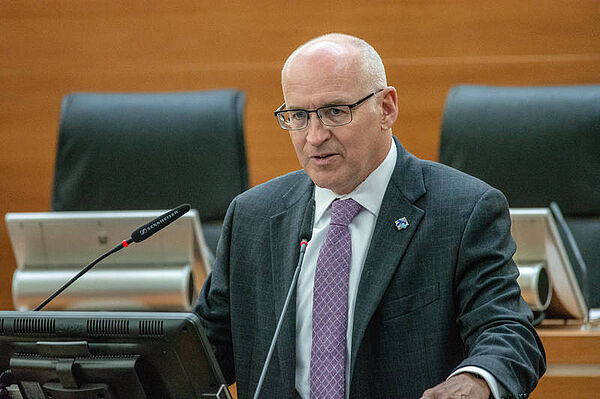
On 3 August 2018, Mr Frederick Kenney, Director of Legal and External Affairs of the International Maritime Organization, was the guest speaker at the IFLOS Summer Academy 2018 Open Event, addressing the topic “IMO – Latest Achievements, Current Issues and Challenges”. Following a welcome by the Registrar, Mr Philippe Gautier, Mr Kenney provided a review of the work done by the IMO in recent years, noting in particular the challenges posed by the development of maritime autonomous surface ships and the need for a more flexible regulation process in order to keep up with the pace of technological developments.
ITLOS at conferences
The Deputy Registrar, Ms Ximena Hinrichs Oyarce, gave a lecture to the participants at the EULoS summer school in Genoa on 27 August 2018 on “Dispute settlement in the law of the sea: Global and regional approaches”.
President Paik participated in the 2018 Yeosu Academy of the Law of the Sea on 27-28 August 2018, giving the keynote speech at the opening ceremony and a presentation on the exclusive economic zone. Further lectures concerning the continental shelf and fisheries and a workshop on marine living resources were given to the academy participants by Judge Heidar.
On 3 September 2018 Mr Philippe Gautier, Registrar, addressed the Belgian Society of International Law conference entitled “Arctic and Antarctic regions: New challenges for ocean governance” in Brussels on the topic “New developments with respect to fisheries in the Antarctic”.
President Paik gave the keynote statement ‘Rule of law in the world's oceans and the role of ITLOS’ at the opening of the international law of the sea conference held from 13 to 15 November 2018 in Seoul. ITLOS Judges Jesus, Hoffmann, Cabello Sarubbi and Kittichaisaree, and the Registrar also addressed the conference.
Capacity building
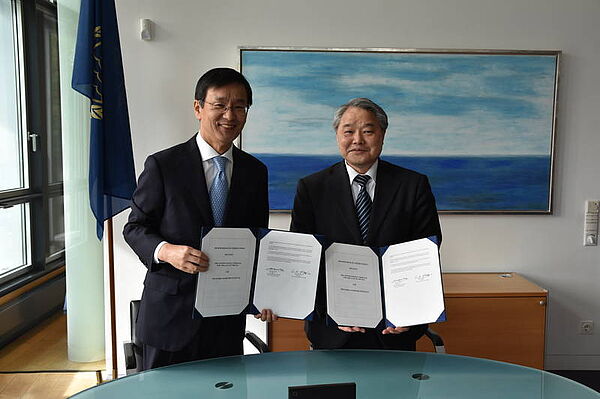
Regional workshops
The President received a delegation from the Korea Maritime Institute, including its President, Mr Changho Yang, on 17 September 2018. On that occasion an MoU was signed contributing KMI funds to the ITLOS Trust Fund for the Law of the Sea, with the aim of supporting the organization of an ITLOS regional workshop in Uruguay in 2019. The series of regional workshops organized by the Tribunal since 2006 includes four workshops in each of the African and Asian regions. The 2019 workshop will be the fifth in the Latin American and Caribbean region, following on from workshops in Kingston (Jamaica), Buenos Aires (Argentina), Mexico City (Mexico) and San José (Costa Rica). As with each event, the upcoming workshop will be tailor-made for the region, involving the participation of the judges from the region and focussing on specific law of the sea issues affecting this region.
Internship programme
The outgoing group of interns, Thaissa Meira (Brazil), Arpita Sachdeva (India) and Yosef Senbeta (Ethiopia), presented their research to the Legal Office just before their departure from the Tribunal at the end of September, tackling the topics “Legal interpretation issues and international jurisprudence which applies to marine scientific research in the Area under UNCLOS”, ”Litigating unlawful territorial situations” and “The transit trade of land-locked States with special reference to Ethiopia”, respectively. The Tribunal is pleased to welcome three new interns in the Legal Office: Mr Arnold Egon (Cameroon); Ms Kristina Gurova (Bulgaria); and Ms Yunjin Kim (Republic of Korea), who will be with us until December.
Applications from students or recent graduates for the next available internship period, from April to June 2019, are welcomed, not simply for an internship in the Legal Office but also for the Library (for those studying library science or information management), Linguistic Services (for students with English and French and enrolled in a translation or interpretation degree course) and the Press Office (aimed at students of public relations, communications or journalism). Information about the programme, the funding available for nationals of developing countries, and the application form are available on our website Training pages.
ITLOS - Nippon Foundation capacity-building and training programme on dispute settlement under UNCLOS
Our six fellows have followed a busy schedule of lectures and visits since their arrival in July and their participation in the IFLOS Summer Academy. Thus far, lectures on the following topics have been organized for the fellows: the jurisdiction of the Tribunal; dispute settlement under Part XV of the Convention; conciliation; arbitration; presentations before international courts and tribunals from a practitioner’s perspective; legal writing and oral advocacy; filing a case and constituting a team; State responsibility; the rights of landlocked countries and the law of the sea; delimitation of the continental shelf beyond 200 nautical miles; the role of the hydrographer and the use of maps; and the Fish Stocks Agreement and regional fisheries management organizations. The fellows have also visited the Directorate General for Maritime Affairs of the European Commission in Brussels; the Federal Maritime Agency in Hamburg; the Maritime Safety and Security Centre of the Federal Government in Cuxhaven; as well as the Hamburg headquarters of the Döhle Shipping Group.
Chinese Society for the Law of the Sea Moot Court
Judges Gao, Kittichaisaree and Registrar Gautier participated as judges in the final of the first international law of the sea moot court competition of the Chinese Society for the Law of the Sea, hosted by the China University of Political Science and Law in Beijing on 27-28 October 2018. We congratulate the winning team from the International Islamic University Malaysia.
Hamburg Model United Nations Conference
Legal Officer Matthias Fueracker gave one of the keynote speeches at the opening ceremony of the third Alster Model United Nations Conference in Hamburg. Bringing together delegates from colleges and secondary schools from all over Europe, the topics discussed by the conference were, inter alia, preventing the use of chemical weapons; ensuring access to affordable, reliable and sustainable energy; and territorial disputes in the Arctic. The Tribunal congratulates the organizers of this year's conference on a well-organized and successful event.
Meet ITLOS alumni
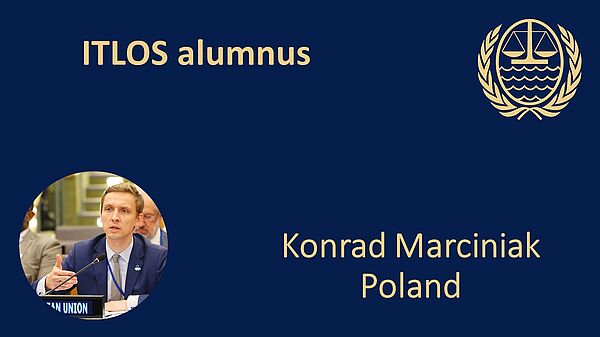
Konrad Marciniak (2010 intern) is currently Deputy Director at the Legal and Treaty Department of the Ministry of Foreign Affairs of the Republic of Poland.
My internship at ITLOS took place in the period July-September 2010. Back then, I had already worked at the Polish Ministry of Foreign Affairs (MFA) (since 2007), as well as at the University of Cardinal Stefan Wyszynski in Warsaw (since 2006). In both capacities, I was engaged, in particular, with the law of the sea. At the Ministry, as part of my duties I participated in the meetings of the European Union Working Party for the Law of the Sea (COMAR), as well as law of the sea-related meetings at the United Nations (in particular: the consultations concerning the General Assembly resolution on oceans and the law of the sea and the Meeting of States Parties to the United Nations Convention on the Law of the Sea). I was also responsible for the Polish internal ratification procedures relating to treaties concerning maritime or environmental affairs. At the university, I taught a general course on international law and EU law-related courses and, in particular, I started preparing my PhD thesis on marine genetic resources in international law (I eventually defended it in 2014, and it was published in C.H. Beck in 2016).
Hence, when I first entered the premises of the Tribunal in 2010 to start my internship, I already had some experience, both in theory and practice, with general international law and with the law of the sea in particular. Nevertheless, being an intern at the Tribunal has had a profound and multi-faceted influence on me. First of all, it was there that I had my first practical contact with the international judicial system. For any lawyer, and perhaps for an “internationalist” in particular, being able to see how a given court works, how it handles and prepares for cases, instead of “just” reading the final judgment or decision, is a really unforgettable and important lesson. In this context, it is worth mentioning that ITLOS had then on its docket its first delimitation case (Case No. 16, Dispute concerning delimitation of the maritime boundary between Bangladesh and Myanmar in the Bay of Bengal, Bangladesh/Myanmar) and its first Advisory Opinion (Case No. 17, Responsibilities and obligations of States sponsoring persons and entities with respect to activities in the Area).
Secondly and in conjunction with the above, I was able to learn a great deal not only about how the international dispute-settlement mechanism functions in practice, but also about many aspects of the law of the sea as such.
Thirdly, this was all made possible by the wonderful and professional ITLOS staff and fellow interns I was able to work and engage with. I cannot list all of them in this short contribution, but I would especially like to thank Ms Ximena Hinrichs Oyarce whom I had the pleasure to have as my supervisor during my internship. Thanks to her trust and knowledge, I was really able to make full use of my stay at the Tribunal.
Finally, it is important to point out that the Tribunal has a voluminous library containing works related, in particular, to the law of the sea. It was an indispensable tool when it came to researching my daily assignments as well as for my PhD thesis, then under preparation.
For all the above reasons, from better knowledge about the substance of the law of the sea and the related judicial mechanism to personal contacts, I still benefit from my internship at the Tribunal. Suffice to say that only one year after it finished, Poland assumed the presidency of the EU Council (in the second half of 2011) which, for me, meant chairing the COMAR and, in this capacity, negotiating on behalf of the EU on the United Nations General Assembly resolution on oceans and the law of the sea. The law of the sea has remained with me till today. Even after taking up my duties as Deputy Director for Treaty Affairs at the Legal and Treaty Department of the Polish MFA (in 2014), I continue to deal with the law of the sea. I still participate in COMAR meetings, represent Poland in Antarctic Treaty Consultative Meetings, and also make frequent visits to the United Nations. In this latter context, the one issue that truly dominates my agenda is the ongoing intergovernmental negotiations on the conservation and sustainable use of marine biological diversity in areas beyond national jurisdiction (so-called IGC BBNJ). Here, both the topic of my PhD as well as my internship at ITLOS prove useful, as I am both one of the co-negotiators for the EU (with regard to one of topics forming part of the negotiating package, namely marine genetic resources, including questions on the benefit sharing), as well as a member of the IGC Bureau (for Poland).
I also endeavour to continue my academic path (although I do not work regularly at the University anymore) by writing scholarly articles or participating in international conferences, mostly focussing on the law of the sea. By way of example, I should mention in this context that I was recently able to contribute to the illuminating conference “New knowledge and changing circumstances in the law of the sea’ (28-30 June 2018, Reykjavik), jointly organized by ITLOS Judge Tomas Heidar.
I am confident that, as ITLOS and its jurisprudence evolve, so will the internship programme. I would encourage anyone to apply, especially somebody with a keen interest in the law of the sea. Surely, in the face of growing, global threats, including for the marine environment, it is important that the Tribunal continues to serve as one of the UNCLOS dispute-settlement mechanisms as well as to contribute to education in the field of the law of the sea.
Upcoming events
President Paik will report on the Tribunal’s work in his statement to the General Assembly of the United Nations on 11 December 2018 when the Assembly deals with the agenda item “Oceans and the law of the sea”.
Deliberations in The M/V "Norstar" Case (Panama v. Italy) continue in January 2019. The judgment is expected to be delivered in spring 2019.

